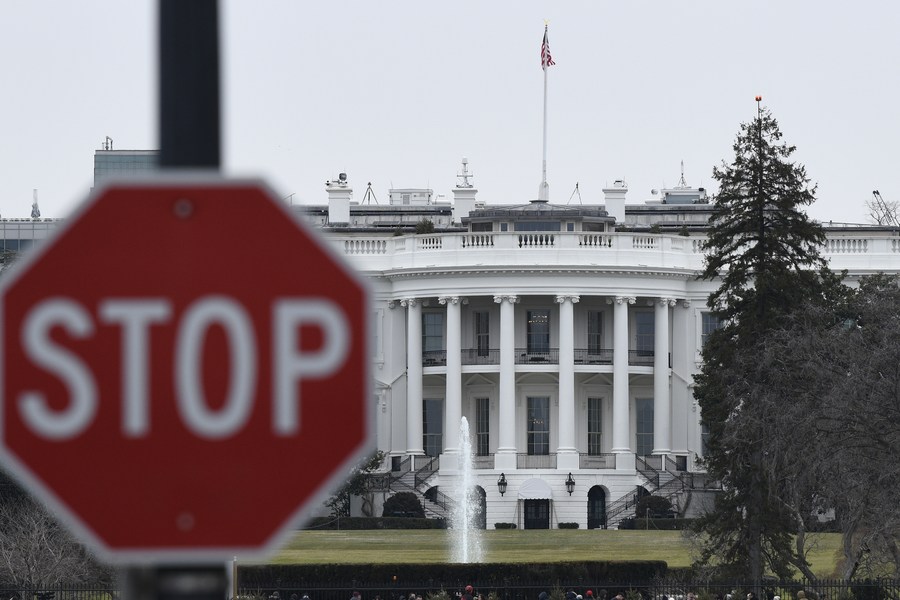
This photo shows the White House and a stop sign in Washington DC. [Photo/Xinhua]
This is an editorial from China Daily.
The United States knows every trick in the book, and is always ready to prove it. In the latest demonstration of its mastery of the dark arts of gamesmanship, US Seventh Fleet Commander Vice-Admiral Karl Thomas told reporters in Singapore on Tuesday that China was like "a gorilla in the room".
Saying that it was irresponsible of the People's Liberation Army "to launch missiles over Taiwan into international waters", he claimed that "if we just allow that to happen, and we don't contest that, that'll be the next norm".
Clearly, the US is quite willing to crow like a frustrated cockerel and steal like a mangy stray.
It is Washington's continual reneging on the diplomatic commitments that it made to Beijing on the Taiwan question that is irresponsible, and which, if not contested by Beijing, will make its provocative collusions with the island's Democratic Progressive Party a dangerous new norm.
The top US military official in Asia also accused the PLA of so-called increasingly assertive efforts to intercept US and allied military aircraft in the skies over the Pacific; he failed to mention what those aircraft are doing there in the first place.
Given the steady stream of escalating provocations by Washington, such as selling arms to the island, sending US warships to sail through the Taiwan Straits and staging high-profile visits to the Chinese island by officials, all of which hollow out the one-China principle the US claims to abide by, Beijing has a legitimate right to take countermeasures.
The PLA has made it clear that it will take action to resolutely smash any act that aims to split Taiwan from the motherland, even at the cost of war. To try and mask its dirty deeds, Washington is trying to distort the PLA's natural shouldering of its responsibility to defend China's sovereignty and territorial integrity, and concocting the narrative that China is seeking to imminently — and it claims unwarrantedly — realize reunification by force.
On Tuesday, State Councilor and Defense Minister Wei Fenghe again set out China's position clearly. He said that the country's armed forces will certainly act to safeguard national sovereignty and territorial integrity and resolutely counter any attempts to separate Taiwan from the motherland.
But he also made it clear that China's armed forces are willing to deepen defense and security cooperation with the defense forces of other countries to promote the implementation of the Global Security Initiative that China has proposed as a means to establish a fair and stable global security framework.
Unfortunately, because of US House Speaker Nancy Pelosi's ill-judged and ill-intentioned visit to Taiwan, the key communication mechanisms between the Chinese and US militaries have been canceled as part of the Chinese countermeasures.
Under such circumstances, and with Washington showing no sign of changing tack, the risk of clash between Chinese and US militaries has increased immeasurably. Instead of exacerbating a crisis of its making by accusing the PLA of overreacting, Washington would do better to reflect on the potential consequences of its provocations and reconsider the wisdom of building up its own and allied military presence in the region.
A miscalculation will be hard to correct.

 中文
中文





